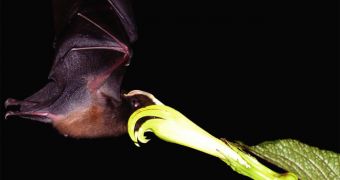You get fat by only drinking water, but bats can burn sugar faster than top-class athletes, having the fastest sugar-burning metabolism amongst all mammals on Earth.
This is the result of a research made on American nectar-feeding bats (encountered in tropical America): within minutes of stopping for sugar-rich flower nectar, these tiny flying mammals start to burn the sugars from the nectar. "To keep airborne is the most costly activity. It is a dilemma they have to fly to forage for nectar, and they spend most of the energy from nectar with flying." said co-author Christian Voigt of the Leibniz Institute for Zoo and Wildlife Research in Germany.
She and co-author John Speakman of the University of Aberdeen in the United Kingdom offered to a dozen captive bats sugar containing carbon-13 (C13, a non-radioactive isotope easy to track down) and measured how much carbon-13 the bats exhaled.
"We found that nectar-feeding bats made use of the sugar they were drinking for their metabolism within minutes after drinking it. After less than half an hour they were fueling 100 % of their metabolism from this source." wrote the researchers. Nectar-feeding bats rely on the flower nectar, rich in simple sugars like sucrose and glucose. These sugars are rapidly metabolized, offering bats a sudden burst of energy required for them to hover like hummingbirds. This type of flight requires a lot of energy consumption.
"They can fuel their metabolism also on fat or glycogen at night, but then they run out of energy for the day," Voigt told LiveScience.
"Therefore, nectar-feeding bats are active throughout the whole night, visiting hundreds of flowers per night and covering large distances of several kilometers."
In most mammals (including humans), any food source is turned into storage (fat and glycogen). When animals need fuel, they take it from their reserves.
"Small nectar-feeding bats have among the highest metabolic costs among mammals, and mostly eat a diet low in fat and protein but rich in sugars. Metabolizing these sugars immediately [when] they are consumed, saves the costs of converting them to and from storage." wrote the authors.

 14 DAY TRIAL //
14 DAY TRIAL //